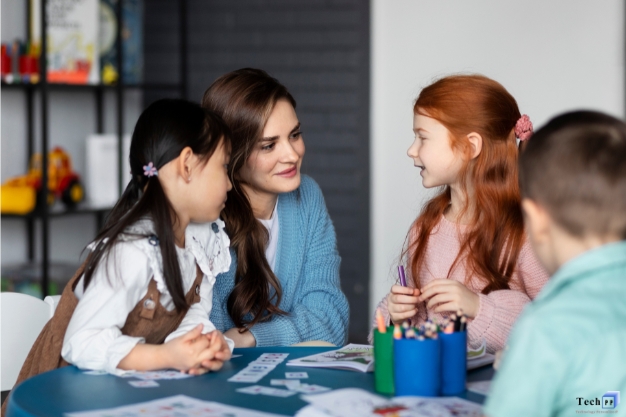Social Skills Early childhood peer interactions are essential for developing emotional intelligence, healthy relationships, and life skills. Quality interactions in early years boost social competence, academic success, and collaboration. Parents and educators can support this by encouraging positive peer engagement.
The Foundation of Social Learning Through Peers
Modeling and Imitation in Action
Children learn differently from peers than they do from adults. When a four-year-old watches another child successfully join a game, they observe strategies they can immediately apply in similar situations. This peer modeling proves particularly powerful because children readily identify with others who share their developmental stage and perspective.
These observations teach children practical social skills that adult instruction alone cannot replicate. They learn how to approach new groups, read social cues, and adapt their behavior to different social contexts by watching successful peer interactions unfold naturally.
The diversity found in peer groups exposes children to various social styles and approaches. Some peers may be naturally outgoing, others more reserved. Some solve conflicts through discussion, others through compromise. This variety helps children develop flexible social strategies.
Learning Social Rules and Expectations
Peer interactions introduce children to unwritten social rules that govern group behavior. They discover concepts like fairness, taking turns, and mutual respect through direct experience rather than adult explanation. When conflicts arise, children learn to negotiate solutions that work for everyone involved.
These experiences teach children that social relationships require effort and consideration. They learn that their actions affect others and that maintaining friendships requires ongoing attention to others’ feelings and needs.
Children also discover that different social groups may have different expectations and rules. This awareness helps them develop social flexibility and the ability to adapt their behavior to various social contexts as they grow.
Communication Skills Development
Language Growth Through Peer Interaction
Peer interactions accelerate language development in unique ways. Children hear diverse vocabulary, speaking patterns, and communication styles from their age-mates. They encounter new words in context and learn to adjust their communication based on their audience’s understanding.
The natural give-and-take of peer conversations helps children practice essential communication skills like listening, responding appropriately, and building on others’ ideas. They learn to express their thoughts clearly and persuasively when they want to influence their peers’ decisions or join their activities.
Children also develop non-verbal communication skills through peer interactions. They learn to read facial expressions, body language, and vocal tones to understand their peers’ emotions and intentions. These skills prove essential for effective communication throughout life.
Negotiation and Conflict Resolution
Peer interactions naturally create situations requiring negotiation and problem-solving. When two children want the same toy or disagree about game rules, they must find solutions that work for both parties. These experiences teach valuable conflict resolution skills that serve them well in future relationships.
Children learn to express their needs clearly, listen to others’ perspectives, and find creative compromises through these peer negotiations. They discover that conflicts don’t necessarily end relationships and that working through disagreements can actually strengthen bonds.
Quality peer interactions also teach children when to stand firm and when to compromise. They develop judgment about which issues matter most to them and learn to prioritize their needs in social situations.
Emotional Intelligence and Empathy Development
Understanding Others’ Emotions
Peer interactions provide constant opportunities for emotional learning. Children observe how their actions affect others’ feelings and learn to recognize emotional cues in their peers. They see firsthand how different children express happiness, frustration, sadness, and excitement.
These observations help children develop empathy as they begin to understand that others have feelings similar to their own. They learn to consider how their words and actions might impact their peers and adjust their behavior accordingly.
Children also learn emotional regulation through peer interactions. They see how successful peers manage disappointment, excitement, and frustration. They practice controlling their own emotions when social situations require patience or compromise.
Building Emotional Resilience
Peer interactions inevitably involve some disappointments and challenges. Children experience rejection when they’re told they can’t join a game, frustration when peers don’t share their interests, and sadness when friendships hit rough patches. These experiences, while sometimes difficult, build emotional resilience.
Learning to cope with social disappointments in low-stakes childhood situations prepares children for more significant challenges later in life. They develop confidence in their ability to handle social difficulties and bounce back from setbacks.
Supportive peer relationships also provide comfort and validation that helps children build positive self-concepts. When peers appreciate their contributions and enjoy their company, children develop confidence in their social abilities.
Cooperation and Teamwork Skills
Learning to Work Together
Many peer activities require cooperation to succeed. Building block structures, creating pretend play scenarios, or organizing group games all demand teamwork skills. Children learn to coordinate their efforts, share responsibilities, and support each other’s contributions.
These collaborative experiences teach children that working together often produces better results than individual efforts. They learn to appreciate different strengths and perspectives that peers bring to group activities.
Children also develop leadership skills through peer interactions. They learn to guide group activities, delegate responsibilities, and motivate others to participate. These early leadership experiences build confidence and social competence.
Understanding Group Dynamics
Peer interactions introduce children to group dynamics and social hierarchies. They learn to navigate different roles within groups and understand how individual behavior affects group functioning. They discover the importance of inclusion and learn to recognize when someone feels left out.
Children develop awareness of group decision-making processes and learn to participate effectively in group discussions. They practice expressing their opinions while respecting others’ viewpoints and learn to accept group decisions even when they disagree.
Cultural Understanding and Diversity Appreciation
Exposure to Different Perspectives
Peer groups often include children from diverse backgrounds, exposing young children to different family traditions, languages, and cultural practices. These interactions broaden children’s perspectives and help them develop cultural competence from an early age.
Children learn that families may have different rules, celebrations, and ways of doing things. This exposure helps them become more flexible and accepting of differences they encounter throughout their lives.
Early positive experiences with diversity help children develop inclusive attitudes and reduce prejudicial thinking. They learn to appreciate what makes each person unique while recognizing their common humanity.
Creating Optimal Peer Interaction Opportunities
Quality Over Quantity
The benefits of peer interaction depend heavily on the quality of these experiences rather than simply the amount of time children spend with peers. Structured activities with appropriate adult guidance maximize learning opportunities while minimizing negative experiences.
Small group interactions often prove more beneficial than large group settings, particularly for younger children. These smaller groups allow for more meaningful connections and reduce overstimulation that can interfere with positive social learning.
Regular, consistent peer interactions build stronger social skills than sporadic encounters. Children benefit from ongoing relationships that allow them to practice and refine their social abilities over time.
Adult Support and Guidance
While peer interactions provide unique learning opportunities, appropriate adult supervision and guidance enhance these benefits. Skilled adults help children navigate conflicts constructively, identify successful social strategies, and process their experiences.
Adults can also facilitate peer interactions by creating structured activities that encourage cooperation and communication. They can model appropriate social behavior and help children develop vocabulary for expressing their emotions and needs.
Supporting Social Skill Development at Home
Parents play crucial roles in supporting the social skills their children develop through peer interactions. Discussing social experiences helps children process what they’ve learned and apply these lessons to new situations.
Creating opportunities for peer interactions outside formal settings allows children to practice their social skills in different contexts. Playdates, neighborhood activities, and community events all provide valuable social learning experiences.
Reading books about friendship, cooperation, and problem-solving reinforces the lessons children learn through direct peer interaction. These stories help children understand different perspectives and develop emotional vocabulary.
Long-term Benefits of Early Peer Interaction
The social skills children develop through early peer interactions create foundations for lifelong success. Children who develop strong social competence during early childhood show better academic performance, more positive relationships, and greater life satisfaction as they mature.
These early social experiences also contribute to mental health and emotional well-being throughout life. Children who learn to form positive relationships and navigate social challenges develop resilience that serves them well during adolescence and adulthood. For parents looking to support their child’s social development, try searching for “day care center near me, Casa Adobes Oro Valley” to find local options that foster these important skills.
The communication, cooperation, and problem-solving skills developed through peer interactions become essential workplace competencies. Early social learning thus contributes to professional success and career satisfaction later in life.
Conclusion
Now that we have explored the various aspects of social learning, it is clear that it plays a crucial role in our development as individuals and in society as a whole. From childhood through adulthood, social interactions shape our understanding of the world and ourselves. It helps us learn important skills such as communication, empathy, cooperation, and problem-solving.


